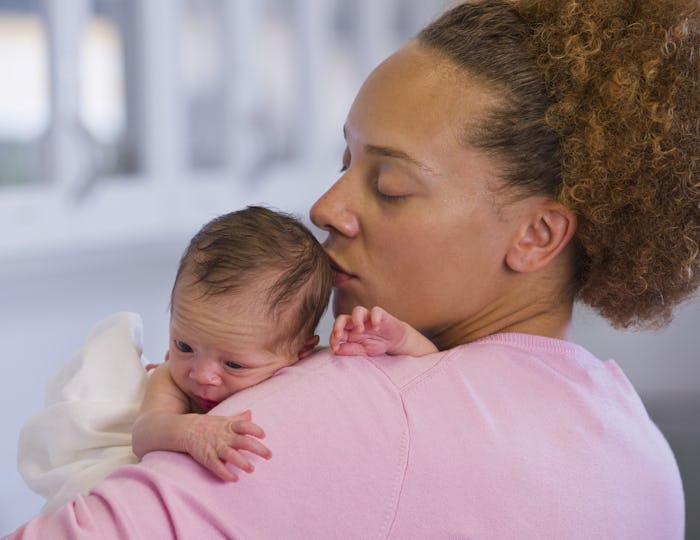Life

5 Newborn Red Flags That Warrant A Call To The Doc
Having a newborn at home can be nerve racking business. New moms are notorious for worrying about every possible thing, and tracking their baby's progress like it's their job (because, well, it is). It can be hard to differentiate between healthy progress and worrisome delays when your baby is so small, so learning the true developmental milestones they should be hitting at each month will give you less to worry about. Similarly, knowing any newborn red flags when it comes to their basic development can give you some guidance when you're deciding whether or not to call the doctor.
I remember worrying about every little thing when I had my first daughter. She hated tummy time, so I worried her head control wouldn't be on track. I watched her eyes obsessively, making sure they tracked movement and reacted to bright lights. Knowing the range of "normal" ahead of time would have saved me a lot of worry and allowed me to simply enjoy the short newborn period even more.
Keep in mind that babies all develop at their own pace. But these guidelines are meant to act as just that, guides to give moms a sense of what is normal and what is worrisome when it comes to their baby.
1They Don't Move Their Eyes Or Have Cross-Eyed Most Of The Time
The American Academy of Ophthalmology (AAO) noted that by one month babies should be able to focus on objects up to three feet away, and by two months they can track moving objects. If you notice that your baby isn't doing this, or tends to go cross-eyed more often than not, you should take them in.
2They Don't Respond To Loud Noises Or Bright Lights
The AAO also noted that by 2 weeks old, your baby's pupils will respond to bright lights and shadows. And their hearing develops even earlier. According to Baby Center, by the 20th week of your pregnancy, your baby's hearing is fully developed, meaning that they should respond to loud noises long before they're born.
You don't have to expect your baby to jump at every noise, but if they're not startled sometimes by loud sounds or don't seem to differentiate between bright and regular lights, there may be a problem with their eyes or ears.
3They Don't Notice Their Hands
Most babies develop a fascination with their hands and enjoy playing with and watching them by about three months, the AAO noted. If you don't notice this, schedule an appointment for your baby's eyes to be checked.
4They Don't Smile At Familiar Faces
Babies are most interested in looking at faces — especially those of their parents and family members. If you notice your baby doesn't smile at or seem to recognize familiar faces, take them in for a check up.
5They Don't Improve In Head Control
Baby Center noted that by the end of your baby's first month the should be able to lift their head briefly and turn it while lying on their stomach. By three months, your baby should have much better control of their head and need less support from you.